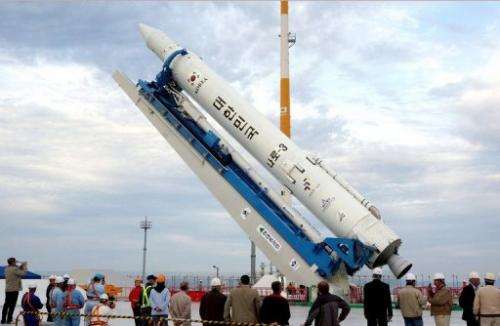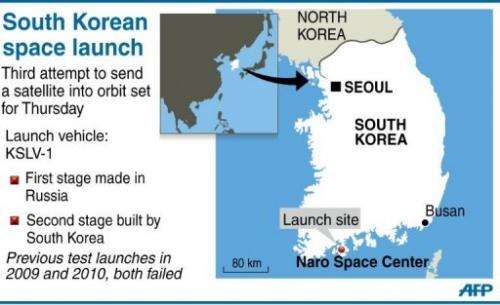S. Korea readies new bid to join global space club (Update)

South Korea braced Thursday for its third attempt to send a satellite into orbit and lay down a national marker in the high-cost world of commercial space technology and exploration.
After two previous failures in 2009 and 2010, the 140-tonne Korea Space Launch Vehicle (KSLV-I) was scheduled to blast off some time after 4:00pm (0700 GMT) Thursday from the Naro Space Center on the south coast.
Success will mean a huge boost for South Korea, which is desperate to get its commercial launch programme up and running, and join an elite space club that includes Asian powers China, Japan and India.
"We need to have our own space rocket facilities on our own soil," Korea Aerospace Research Institute scientist Chae Yeon-Seok told AFP.
"It will play a huge role in securing cutting-edge technology, developing high value-added industries and expanding our presence in the global aerospace market," Chae said.
A final dress rehearsal was carried out on Wednesday, involving launch simulations of both the rocket's Russian-built first stage and the South Korean-built second stage.

The launch had initially been scheduled for October 26, but was cancelled at the last minute after engineers detected a broken rubber seal in a connector between the launch pad and the first stage.
A long delay ensued as the faulty seal was sent to the Russian manufacturer to be replaced.
Seoul's space ambitions were restricted for many years by its main military ally the United States, which feared that a robust missile or rocket programme would accelerate a regional arms race, especially with North Korea.
South Korea's space budget for 2012 is around $200 million, according to the Science Ministry—a paltry sum compared to the billions being pumped in by governments in Beijing, Tokyo and New Delhi.
Whatever the outcome of Thursday's launch, South Korea insists it remains committed to developing a totally indigenous three-stage, liquid-fuelled rocket capable of carrying a 1.5-tonne payload into orbit by 2021.
In 2009, the rocket achieved orbit but faulty release mechanisms on the second stage prevented proper deployment of the satellite.
The second effort in 2010 saw the rocket explode two minutes into its flight, with both Russia and South Korea pointing the finger of blame at each other.
The KSLV-I will carry a small, 100 kilogram (220-pound) Science and Technology Satellite-2C (STSAT-2C) developed by the Korea Advanced Institute of Science and Technology.
The satellite, which has a one-year operational lifespan, will mainly collect data on space radiation.
(c) 2012 AFP


















